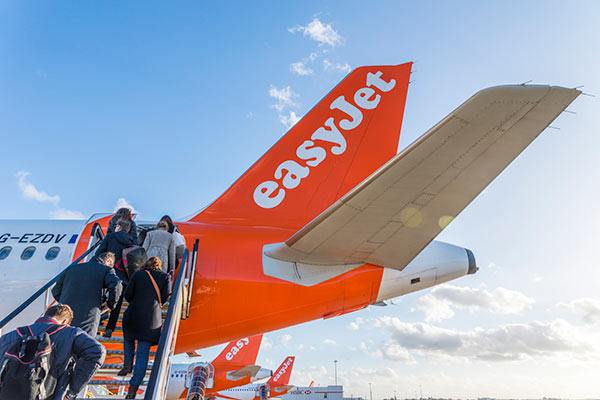easyJet shares tumble despite rising profits
There was lots to like in these third-quarter results, but that was more than offset by a few headwinds. ii's head of markets runs through the numbers.
17th July 2025 08:21
by Richard Hunter from interactive investor

A strong quarter positions easyJet (LSE:EZJ) for another profitable year, despite the unwelcome headwinds of higher costs arising from the recent strength of fuel and industrial action by French air traffic controllers.
- Our Services: SIPP Account | Stocks & Shares ISA | See all Investment Accounts
Revenues of £2.91 billion for the quarter ended 30 June represented an increase of 10.9% from the corresponding period, with pre-tax profit rising by 21.2% to £286 million. Higher fuel costs will add an estimated £10 million to the group’s bill and the industrial action a further £15 million. These contributed to costs per seat rising by 5.3% to £79.81, although this was more than offset by a 6.3% increase in revenues per seat to £86.78.
In addition, the benefit of increasing ancillary revenues, which include the likes of customer payments for personally allocated seats, baggage and food, were in evidence, now accounting for 25% of group revenue. Customers are clearly still readily prepared to pay for these extras, while also adding another string to the group’s revenue bow.
However, it was the easyJet holidays business which again stole the show for the quarter. This is a burgeoning business which seems to have come at the right time, with cost-conscious consumers searching for value packages. The group has high hopes for the unit’s longer-term contribution to overall profits, which currently accounts for 15% of total group revenue en route to a medium-term target of more than £250 million of annual pre-tax profit.
Indeed, that aim is coming into view with an estimated annual pre-tax profit of over £235 million, bolstered by a quarterly profit of £86 million which was an improvement of 18% year-on-year, alongside a 27.4% rise in revenues to £428 million.
- Here’s where professional investors are piling in
- Investors disembark Jet2 shares after annual results
This also chimes with the group’s value-conscious appeal and the increasing body of evidence which tends to suggest that the family holiday remains almost sacrosanct and outside of normal budgetary restraints. Nor is the group stopping there, with the recently announced tie-up with Tesco Clubcard putting the new brand in front of 23 million households.
Elsewhere, the key metrics were maintained, with passenger numbers up by 2%, and with marginal increases to both seats flown of 28.7 million and a load factor of 90.2%. The group’s balance sheet also improved markedly, with net cash increasing from £327 million at the end of March to £803 million at the end of June. Shareholder returns could therefore be of greater interest over the coming months, with the current dividend yield of 2.3% remaining somewhat pedestrian.
In terms of outlook, the group remains positive for the remainder of the year and the peak summer season, although it also recognises an increasing trend towards last-minute bookings. Even so, there is some visibility of earnings with the fourth quarter already 67% sold, and the winter period 50%, although this is apparently not enough for easyJet to avoid the trapdoor which befell Jet2 Ordinary Shares (LSE:JET2) when it reported full-year numbers last week on a lack of clear guidance.
For all the progress, the industrial action in France is the latest reminder of a litany of woes which have affected the sector over the years, ranging from volcanic ash clouds and geopolitical tensions to virus outbreaks. Indeed, the share price remains down by 59% from pre-pandemic levels, let alone the record highs of ten years ago, since which time the shares have fallen by 66%, resulting in the group flitting in and out of the premier index.
- Mansion House speech: what it means for your money
- Fund Spotlight: a way to play value being back in vogue
- Sign up to our free newsletter for investment ideas, latest news and award-winning analysis
Over the last year, there has been reasonable progress as the shares have risen by 7%, as compared to a gain of 9% for the wider FTSE100, although trailing in the wake of sector peer International Consolidated Airlines Group SA (LSE:IAG), where an increase of 119% over the same period underlines where investors’ priorities have been.
The share price reaction further underlines this gulf, and is a harsh reminder of the cyclicality and competitiveness of the business. Even so, it is difficult to dispute that easyJet continues its ascent, underpinned by increasing ancillary revenues and profits for the holidays business. The share price decline emboldens the group’s undemanding valuation which, coupled with optimism surrounding prospects for the sector as a whole, should enable the market consensus as a buy to remain intact.
These articles are provided for information purposes only. Occasionally, an opinion about whether to buy or sell a specific investment may be provided by third parties. The content is not intended to be a personal recommendation to buy or sell any financial instrument or product, or to adopt any investment strategy as it is not provided based on an assessment of your investing knowledge and experience, your financial situation or your investment objectives. The value of your investments, and the income derived from them, may go down as well as up. You may not get back all the money that you invest. The investments referred to in this article may not be suitable for all investors, and if in doubt, an investor should seek advice from a qualified investment adviser.
Full performance can be found on the company or index summary page on the interactive investor website. Simply click on the company's or index name highlighted in the article.